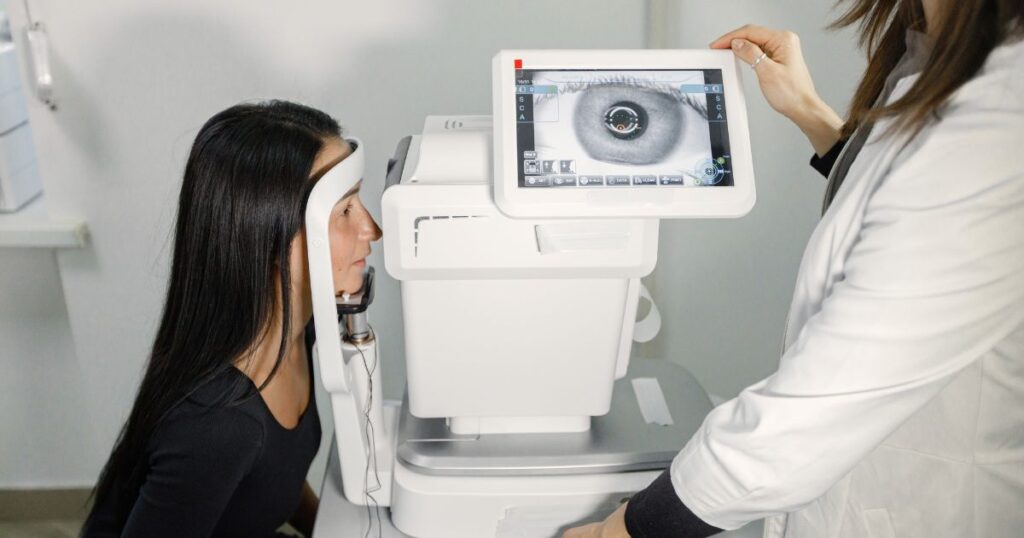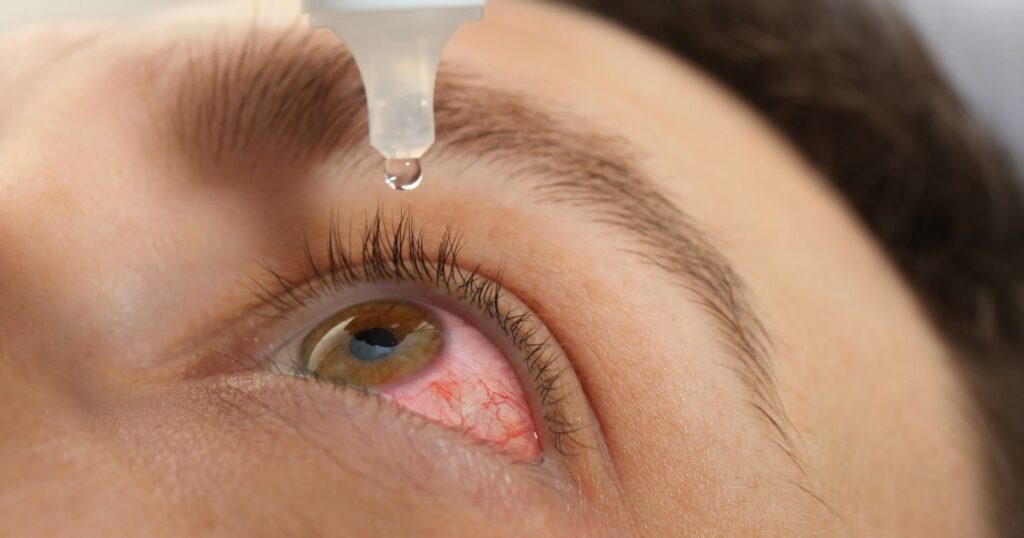Dry Eye Syndrome (DES) is a common condition that affects millions of people worldwide and affects 1 in 4 people in the UK and Ireland. It occurs when the eyes do not produce enough tears or when tears evaporate too quickly, leading to discomfort and potential vision problems.
In this blog post, we help you understand the symptoms, causes, treatment options for dry eyes and how booking an eye test with your local optician can help you find a solution.
What is dry eye syndrome?
Dry eye syndrome, also known as keratoconjunctivitis sicca, is a common condition that occurs when your tears aren’t able to adequately lubricate your eyes. This can happen due to insufficient tear production or poor-quality tears, leading to tear instability and damage to the eye’s surface.
The common symptoms of dry eye syndrome
Common symptoms of dry eye syndrome include:
- A stinging, burning, or gritty sensation in your eyes.
- Redness of the eyes.
- Blurred vision.
- Sensitivity to light.
- A feeling of having something in your eyes.
- Watery eyes (as the eye tries to compensate for dryness).
- Eye fatigue.
- Difficulty wearing contact lenses.
Causes and risk factors of dry eyes
You could get dry eyes due to a whole range of reasons. If you want to cure your dry eyes, it’s important to get to the root of the problem.
- Aging: Tear production decreases with age
- Environmental conditions: Wind, smoke, and dry air exacerbate symptoms
- Screen time: Prolonged use of digital devices reduces blinking frequency
- Medications: Certain antihistamines, decongestants, and antidepressants affect tear production
- Medical conditions: Autoimmune diseases such as Sjögren’s syndrome and diabetes
- Hormonal changes: Pregnancy, menopause, and birth control pills
- Allergies: Allergies to dust and pollen can cause dry eyes
Learn more: Managing Eye Allergies: Tips for Relief and Prevention
It is important to book an eye test, so your optometrist can consult with you about your lifestyle and symptoms to get to the root cause of the problem.
How dry eye syndrome affects vision
Dry eye syndrome disrupts the delicate tear film that coats the surface of your eyes, leading to a range of visual disturbances. Because tears are essential for maintaining a smooth corneal surface, inadequate or poor-quality tears can cause blurred or hazy vision that may fluctuate throughout the day.
This instability in vision can make tasks requiring sustained focus, such as reading, computer work, or driving, significantly more challenging. Also, dry eyes can increase sensitivity to light, causing discomfort and further impairing visual clarity.
In severe and untreated cases, chronic dry eye can lead to damage to the cornea, the clear front surface of the eye, potentially resulting in more significant and lasting vision problems. It is important to visit your local optometrist if your dry eye issues persist.
How do optometrists test and diagnose dry eyes?

Eye care professionals diagnose Dry Eye Syndrome through:
Schirmer’s Test: This test measures the volume of tear production by placing filter paper under your eyelid away from the cornea, revealing if insufficient tear quantity is contributing to dry eye symptoms.
Tear Break-Up Time (TBUT): This test evaluates the stability of the tear film by observing how quickly it evaporates, indicating whether the tears are of poor quality and prone to rapid evaporation.
Osmolarity Test: This test determines the concentration of dissolved particles in the tears, providing insight into tear quality and the severity of dry eye by identifying imbalances in the tear composition.
How can I treat dry eyes?

Treating dry eyes at home
- Warm Compresses: Apply a warm, wet washcloth ( or dedicated Eye Mask ) to closed eyes for a minute or more to loosen clogged oil glands.
- Eyelid Hygiene: Gently wash your eyelashes and eyelids with dedicated products such as Blephasol or Blephaclean to reduce inflammation and remove any dry residue.
- Increased Blinking: Make a conscious effort to blink frequently, especially during screen time.
- Computer Ergonomics: Position your computer screen below eye level to minimise tear evaporation.
- Omega-3 Fatty Acids: Consume oily fish (salmon, tuna) or omega-3 supplements to improve gland function.
- Hydration: Drink plenty of water throughout the day to keep eyes moist.
- Protective Eyewear: Wear wraparound sunglasses to shield eyes from drying winds.
- Humidifier Use: Add moisture to dry indoor air with a humidifier.
How an optometrist can help with dry eyes
Optometrists can help with dry eyes by:
- Personalised Advice: They’ll give you specific tips based on your eyes and lifestyle.
- Finding the Cause: They’ll use tests to figure out why your eyes are dry.
- Recommending Best Treatments: They’ll suggest the right over-the-counter wipes, drops or ointments for you.
- Lifestyle Tips: They’ll advise on things like computer use and humidity.
- Advanced Treatments: For severe cases, they can offer advice on prescription options or other therapies.
Over the counter treatments include:
- Artificial tears
- Lubricating eye drops
- Ointments for nighttime use
- Eyelid wipes to remove irritants
Managing dry eye syndrome with contact lenses
Wearing contact lenses can exacerbate dry eye symptoms, but there are steps you can take to find relief.
Discuss your dry eye with your optometrist
They can assess your specific situation and recommend suitable contact lens options or alternative solutions. They might suggest switching to daily disposable lenses, which minimise build-up and irritation, or silicone hydrogel lenses, which retain more moisture.
Use lubricating eye drops
Using lubricating eye drops specifically formulated for contact lens wearers is crucial. Make sure to look for preservative-free options to avoid further irritation. Consider reducing contact lens wearing time, especially during activities that strain your eyes, like prolonged computer use.
Use a humidifier
A humidifier can help increase the moisture in the era, which can lead to reduced evaporation from the moisture in your eyes, which can therefore reduce dryness.
Frequently Asked Questions (FAQs)
Can dry eye syndrome go away on its own?
Mild cases may improve with lifestyle changes, but chronic dry eye requires ongoing management.
Are there any natural remedies for dry eyes?
Yes, warm compresses, omega-3 supplements, and proper hydration can help relieve symptoms.
Can contact lenses make dry eye syndrome worse?
Yes, some lenses absorb moisture from the eye. Switching to daily disposables or scleral lenses may help.
How often should I use artificial tears?
It depends on severity. Some people need drops multiple times daily, while others use them as needed.
When should I see an optometrist for dry eyes?
If symptoms persist despite home remedies and over-the-counter treatments, consult an eye specialist.
Visit your local opticians in Ballybofey and Strabane
If you’re experiencing persistent dry eye symptoms and need to seek expert advice, don’t hesitate to contact our experienced optometrists in Ballybofey and Strabane. We can provide comprehensive eye examinations, personalised treatment plans, and guidance on managing dry eye syndrome effectively.
Whether you’re looking for relief from discomfort, advice on contact lens wear, or information on advanced treatment options, we’re here to help you maintain optimal eye health. Schedule an appointment today for an eye test and take the first step towards clearer, more comfortable vision.
If constant contact lens wear is exacerbating your dry eyes, come and explore our wide range of glasses at Gormley Opticians, and discover comfortable alternatives for lasting relief.
There’s always an offer at Gormley’s!





